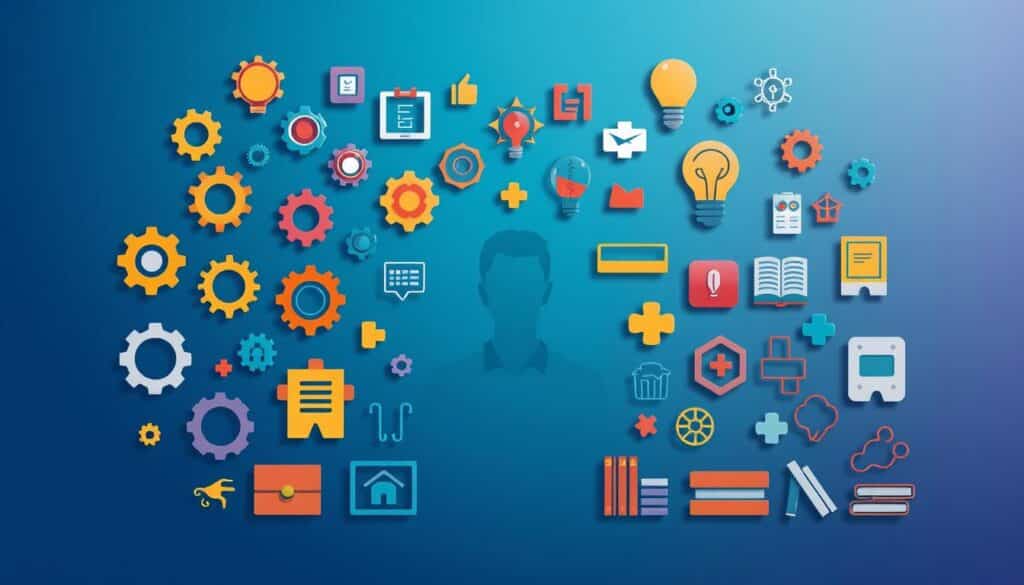Skill development is key for career growth in today’s fast-changing job market. By always looking to improve, you can stay ahead in your field. This article will cover how to assess your skills, keep learning, and grow both soft and technical skills.
It will also talk about building professional networks and making a career plan. These steps are important for long-term success.
Key Takeaways
- Skill development is crucial for career growth in today’s dynamic job market.
- Strategies include assessing current skills, continuous learning, developing both soft and technical skills, and building professional networks.
- Soft skills like communication, leadership, and time management are essential for career advancement.
- Pursuing online courses, certifications, and reskilling/upskilling programs can enhance technical skills.
- Networking and mentorship can provide guidance, motivation, and access to industry connections.
The Importance of Skill Development
Skill development is key for career growth and success at work. It covers professional skills and technical skills. Professional skills, or soft skills, include habits and abilities like communication and problem-solving. Technical skills, or hard skills, are the specific knowledge needed for certain tasks.
Investing in skills helps both employees and employers. For employees, it boosts job satisfaction and opens new career paths. For employers, it makes their workforce more skilled and adaptable, leading to better productivity and innovation. It also lowers employee turnover and recruitment costs, making the company more attractive to work for.
Professional vs. Technical Skills
Professional skills, or soft skills, are vital for any career. They include skills like communication and teamwork. Technical skills, or hard skills, are specific abilities needed for certain jobs, like programming or accounting.
Benefits for Employees and Employers
Developing both professional and technical skills brings many benefits. Employees see better job satisfaction and career opportunities. Employers get a more skilled workforce, leading to better productivity and innovation. Skill development also helps keep employees, saving on recruitment and training costs.
In summary, skill development is crucial. By improving their professional skills and technical skills, individuals boost their careers and value to employers. Employers gain a more skilled workforce, leading to better employee retention and business success.
“The wage penalty for low literacy is nine percentage points in Colombia, Georgia and Ukraine and 19 percentage points in Ghana.”
Assess Your Current Skillset

Start by looking at your current skills honestly. This means finding out what you’re good at and what you need to work on. Knowing your strengths and weaknesses helps you plan how to improve your skills.
Identify Strengths and Weaknesses
First, think about your strengths. These are the skills you do well and help you succeed. Skills like communication, problem-solving, and technical knowledge are important.
Then, look at your weaknesses. These are areas where you might need to get better. Skills like public speaking, time management, or technical skills might need work. Knowing your weaknesses helps you focus on improving.
Align Skills with Career Goals
After understanding your skills, match them with your career goals. Think about what skills you need for your dream job. Make a plan to get or improve those skills. This way, your skill development helps you reach your career goals.
| Skill | Proficiency Level | Importance for Career Goals |
|---|---|---|
| Effective Communication | Proficient | High |
| Adaptability | Moderate | High |
| Critical Thinking | Advanced | High |
| Project Management | Beginner | High |
“Assessing your current skills is the foundation for developing a comprehensive professional development plan that can help you achieve your career goals and drive your career advancement.”
Continuous Learning and Training

In today’s fast-changing job market, it’s key to keep learning and training. This helps grow your skills and career. By always learning, you become more adaptable and stay relevant, setting yourself up for success.
Reskilling and Upskilling Programs
Reskilling and upskilling programs are great for learning new skills or improving what you already know. These programs, often run by employers or industry groups, keep you up-to-date with job demands. They help you grow in your current role or explore new ones.
Online Courses and Certifications
Online learning has made it simple to find educational resources. Online courses and certifications let you learn new skills and get recognized by employers. They help you keep your skills sharp and move your career forward.
| Continuous Learning Benefits | Statistics |
|---|---|
| Increased Knowledge Retention | Research shows continuous learning can boost knowledge retention by up to 60% over traditional methods. |
| Higher Profit per Employee | Companies investing in employee learning see a 25% profit boost per employee compared to those not investing. |
| Improved Employee Engagement | Companies that encourage learning have 17% higher employee engagement than those without a focus on skills development. |
“Continuous learning is crucial for career growth, emphasizing how individuals need to adapt to changes and new opportunities to avoid career stagnation.”
Skill Development

In today’s job market, having a wide range of skills is key for moving up in your career. While technical skills are important, soft skills can really boost your professional life. Skills like communication, problem-solving, and leadership are valued everywhere. They help you work well with others, handle new challenges, and contribute to your team.
Develop Soft Skills
Working on your soft skills can change your career path. A Fortune and Deloitte survey found that teams focusing on soft skills do better than others. They also show how important Diversity, Equity, Inclusion, and Belonging (DEIB) are in the workplace. Plus, 94% of workers would stay longer if they could learn new skills, which helps companies keep their best people.
Acquire New Technical Skills
Staying current with industry trends means learning new technical skills. By getting the skills that employers want, you can open up new job doors and earn more. Whether it’s coding, using new software, or learning about new equipment, technical skills are crucial for career growth. A McKinsey report says companies that invest in learning and development attract and keep top talent.
Combining soft and technical skills is a winning strategy for your career. It makes you more adaptable, competitive, and impactful in your field. By focusing on both, you can achieve long-term success.
“Managers spend 30% more time learning soft skills than the average learner, according to LinkedIn Learning data.”
Networking and Mentorship
Building a strong professional network and finding a mentor can change your career. By going to industry events, you meet peers, leaders, and mentors. They can guide you, share tips, and open doors to new skills and jobs.
Attend Industry Events for Skill Development and Networking
Going to events like workshops and career fairs is great for networking. You learn from experts, keep up with trends, and make connections. These relationships can lead to new skills and job chances.
Leverage Mentorship for Personalized Career Guidance
Finding a mentor can be a big step in your career. They offer advice, share knowledge, and guide you to reach your goals. You learn from their experience and get insights you might not find elsewhere.
Calkins (2023) says mentors are key for career growth. Mentees are 130% more likely to lead than those without mentors. Chandler (2011) also points out the value of diverse mentors for better career and academic paths.
Networking and mentorship are about more than just connections. They’re about building real relationships that help you grow professionally and open new career doors.
Create a Career Development Plan

Making a detailed career development plan is key to growing your skills and career. It should list clear goals, steps to get or improve skills, a timeline for reaching these goals, and ways to stay accountable. This approach helps align your skill-building with your career dreams.
Begin by setting SMART (Specific, Measurable, Achievable, Relevant, and Time-bound) goals that match your career path. Figure out the skills you need to work on, then make a detailed plan. This might mean taking online courses, getting certifications, or finding a mentor.
- Define your career goals and the skills you need to get there.
- Look for learning resources like online courses, workshops, or events to gain those skills.
- Make a realistic timeline for your skill-building, with milestones to check your progress.
- Find a mentor or join a support group to stay on track and get advice.
- Keep updating your plan to make sure it still fits your changing goals and life.
A career development plan is not just for beginners. It’s a continuous journey that needs commitment, flexibility, and a love for learning. By creating and sticking to a solid plan, you’re on the path to reaching your career dreams.
Also Read : How To Choose The Right Educational Seminars For Your Career Growth
“Investing in your own learning and development is one of the best investments you can make in your career.” – Brian Tracy, author and motivational speaker
Conclusion
Effective skill development is key for long-term career growth and professional advancement. Regularly check your skills, learn continuously, and work on both soft and technical skills. Building strong professional networks and having a detailed career development plan also helps.
Unlocking your full potential starts with a lifelong learning commitment and a proactive skill development approach. This mindset helps you adapt to the changing job market and reach your career goals.
Start your professional development journey by focusing on the right skills, making valuable connections, and creating a strategic plan. With hard work and a growth mindset, you’ll open doors to new opportunities and move your career forward.
FAQs
Q: What are some effective strategies for developing skills in the workplace?
A: Effective strategies include implementing a comprehensive development program that addresses skill gaps, providing access to training programs, and fostering a culture of continuous learning within the organization. This can help employees identify the skills they need and start developing them.
Q: How can organizations identify skill gaps in their workforce?
A: Organizations can identify skill gaps by conducting assessments, surveys, and performance reviews that highlight areas where employees may lack essential skills. This information can inform the development of a targeted skill development plan.
Q: What is the importance of emotional intelligence in professional skills development?
A: Emotional intelligence is an important skill that enhances communication, teamwork, and leadership capabilities. Developing emotional intelligence can improve interpersonal relationships and foster a positive work environment, making it a key focus in skills development programs.
Q: How can employees start developing in-demand skills that align with job opportunities?
A: Employees can start developing in-demand skills by participating in relevant training programs, pursuing certifications, and engaging in self-directed learning. Staying informed about industry trends can also help them identify the skills they need to enhance their career prospects.
Q: What role do development professionals play in workforce development?
A: Development professionals are instrumental in workforce development as they design and implement skills development programs that cater to organizational needs. They assess skill gaps, create training materials, and facilitate workshops to help employees enhance their skills and knowledge.
Q: How can a skills development plan benefit my career growth?
A: A skills development plan provides a structured approach to identifying and acquiring the skills necessary for career advancement. By focusing on both hard and soft skills, individuals can improve their employability and increase their chances of securing better job opportunities.
Q: What are some examples of hard and soft skills to develop for career advancement?
A: Hard skills may include technical abilities like digital skills, coding, or data analysis, while soft skills encompass communication, teamwork, and leadership skills. Both sets of skills are crucial for professional growth and should be incorporated into skills development programs.
Q: Why is it essential to foster a culture of continuous learning in an organization?
A: Fostering a culture of continuous learning encourages employees to actively seek development opportunities, which can lead to improved performance and job satisfaction. It also helps organizations stay competitive by ensuring that their workforce possesses the skills needed to adapt to changing market demands.
Q: How can companies measure the effectiveness of their skills development programs?
A: Companies can measure the effectiveness of their skills development programs through performance metrics, employee feedback, and tracking the impact on overall productivity and job satisfaction. Regular evaluations help organizations adjust their training initiatives to better meet the needs of their workforce.
Source Links
- https://online.uc.edu/blog/career-development-strategies/
- https://www.intoo.com/us/blog/ways-to-help-employees-with-career-development/
- https://robertsmith.com/blog/professional-development-skills/
- https://www.worldbank.org/en/topic/skillsdevelopment
- https://www.coursera.org/enterprise/articles/importance-of-skill-development
